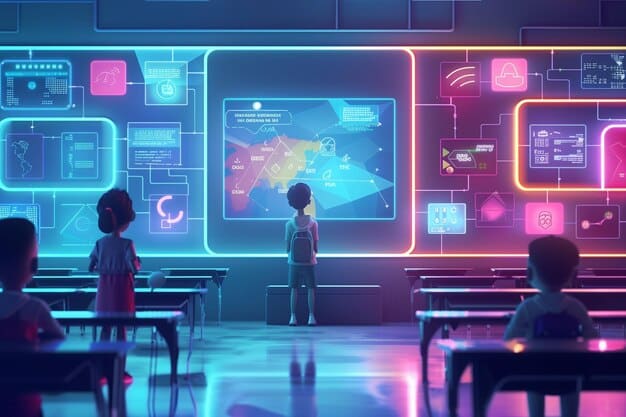AI in Education 2025: Opportunities, Challenges, and the Future of Learning

The Impact of Artificial Intelligence on Education: Opportunities and Challenges in 2025 will be profound, transforming teaching methodologies, enhancing personalized learning, and creating new educational tools, while also presenting challenges such as data privacy concerns and the need for educator training.
The educational landscape is on the cusp of a significant transformation, driven by the relentless advancement of technology. Among these innovations, the Impact of Artificial Intelligence on Education: Opportunities and Challenges in 2025 stands out as a potential game-changer. Are we ready for this revolution?
The Rise of AI in Education: A 2025 Perspective
As we approach 2025, the integration of Artificial Intelligence (AI) into education is no longer a futuristic concept but a tangible reality. AI’s capabilities offer a range of opportunities to enhance learning experiences, personalize instruction, and improve educational outcomes. However, this integration also presents significant challenges that need careful consideration.
AI is set to revolutionize various aspects of education, from automating administrative tasks to providing personalized learning experiences. Let’s explore the key areas where AI is expected to make a significant impact:
Personalized Learning
AI algorithms can analyze student data to identify individual learning styles, strengths, and weaknesses, providing tailored learning paths and content. This personalized approach can lead to increased engagement and improved learning outcomes.
Intelligent Tutoring Systems
AI-powered tutoring systems can provide students with individualized support and feedback, adapting to their pace and level of understanding. These systems can function as virtual teaching assistants, offering 24/7 assistance and guidance.

Here are some specific ways AI-driven systems are enhancing education:
- Providing instant feedback on assignments, allowing students to correct errors and improve their understanding in real time.
- Creating adaptive assessments that adjust the difficulty level based on student performance, ensuring that they are challenged appropriately.
- Generating personalized study plans that focus on areas where students need the most support, maximizing their learning efficiency.
In conclusion, the integration of AI into education offers unprecedented opportunities to personalize learning experiences and improve educational outcomes. However, it also requires careful planning and consideration to ensure that AI is used ethically and effectively to support student learning.
The Opportunities: Enhancing Learning Experiences
The integration of AI in education is opening doors to enhanced learning experiences that were previously unimaginable. From personalized learning paths to interactive educational content, AI is transforming the way students engage with knowledge. The possibilities are vast and promising.
One of the most significant opportunities lies in the ability to personalize education to meet the unique needs of each student. AI algorithms can analyze student data to identify learning preferences, strengths, and weaknesses, enabling educators to tailor instruction accordingly.
Adaptive Learning Platforms
AI-powered adaptive learning platforms can adjust the difficulty level of content based on student performance, ensuring that they are challenged appropriately without being overwhelmed. These platforms can also provide personalized feedback and support, helping students to overcome obstacles and achieve their full potential.
Virtual Reality (VR) and Augmented Reality (AR)
AI can enhance VR and AR experiences by creating immersive educational environments that allow students to explore historical sites, conduct virtual experiments, and interact with complex concepts in a tangible way. This can make learning more engaging and memorable.

Here are some additional opportunities AI offers to enrich the learning experience:
- AI-driven language learning apps can provide personalized feedback and support, helping students to improve their fluency and pronunciation.
- AI can be used to create interactive simulations and games that teach complex concepts in an engaging and accessible way.
- AI-powered tools can analyze student writing to identify areas for improvement, providing personalized feedback on grammar, style, and content.
In summary, AI is revolutionizing the way students learn by providing personalized, interactive, and engaging educational experiences. As AI technology continues to evolve, we can expect even more innovative applications to emerge, further transforming the educational landscape.
The Challenges: Ethical Considerations and Implementation Issues
While the integration of AI in education offers numerous opportunities, it also presents significant challenges that must be addressed to ensure that AI is used ethically and effectively. These challenges range from ethical considerations surrounding data privacy to practical issues related to implementation and educator training.
One of the primary concerns is the ethical implications of using AI to collect and analyze student data. It is crucial to protect student privacy and ensure that data is used responsibly and transparently. This requires establishing clear guidelines and regulations for the collection, storage, and use of student data.
Data Privacy and Security
AI systems often rely on vast amounts of student data to personalize learning and provide targeted support. This data may include personal information, academic performance, and learning preferences. Protecting this data from unauthorized access and misuse is essential.
Bias and Fairness
AI algorithms can perpetuate and amplify existing biases if they are trained on biased data. This can lead to unfair or discriminatory outcomes for certain student groups. It is crucial to ensure that AI systems are designed and trained to be fair and equitable.
Here are some strategies for addressing these ethical and implementation challenges:
- Establish clear ethical guidelines and regulations for the use of AI in education.
- Provide educators with training and support to help them understand and use AI tools effectively.
- Involve stakeholders, including students, parents, educators, and policymakers, in the development and implementation of AI in education.
In conclusion, the successful integration of AI in education requires a careful consideration of the ethical and implementation challenges involved. By addressing these challenges proactively, we can ensure that AI is used to enhance learning experiences and promote equitable outcomes for all students.
The Future of Teaching: The Role of Educators in an AI-Driven World
As AI becomes more prevalent in education, the role of educators is evolving. While AI can automate certain tasks and provide personalized support to students, it cannot replace the human element of teaching. Educators will continue to play a crucial role in guiding, mentoring, and inspiring students.
The future of teaching will involve a blend of traditional teaching methods and AI-powered tools. Educators will need to adapt their skills and strategies to effectively integrate AI into their classrooms. This includes learning how to use AI tools to personalize learning, provide feedback, and assess student progress.
Facilitator of Learning
Educators will increasingly serve as facilitators of learning, guiding students through personalized learning paths and providing support and encouragement along the way. They will also need to foster critical thinking, problem-solving, and creativity skills, which are essential for success in the 21st century.
Ethical Considerations
Educators will play a crucial role in teaching students about the ethical implications of AI and helping them to develop the skills and values needed to use AI responsibly. This includes promoting digital literacy, critical thinking, and ethical decision-making.
Here are some ways educators can prepare for the future of teaching in an AI-driven world:
- Seek professional development opportunities to learn about AI and its applications in education.
- Experiment with AI tools in the classroom and share their experiences with colleagues.
- Collaborate with other educators and technology experts to develop innovative teaching strategies that integrate AI effectively.
In sum, the future of teaching will be shaped by the integration of AI, but the human element of teaching will remain essential. Educators will need to adapt their skills and strategies to effectively integrate AI into their classrooms and guide students through the ever-evolving landscape of education.
AI-Powered Tools and Resources for Educators
The rapid development of AI technology has led to the emergence of a wide range of AI-powered tools and resources designed to support educators in their daily tasks. These tools can help educators personalize learning, automate administrative tasks, and gain insights into student progress.
From AI-driven assessment platforms to personalized learning apps, educators have access to a wealth of resources that can enhance their teaching effectiveness and improve student outcomes. However, it is important for educators to carefully evaluate these tools to ensure that they are aligned with their instructional goals and meet the needs of their students.
Assessment Platforms
AI-powered assessment platforms can automate the grading process, provide personalized feedback to students, and identify areas where students are struggling. These platforms can save educators time and provide valuable insights into student learning.
Content Creation Tools
AI can assist educators in creating engaging and interactive learning materials, such as videos, simulations, and quizzes. These tools can help educators differentiate instruction and cater to the diverse learning needs of their students.
Here are some examples of AI-powered tools and resources that are available to educators:
- Grading and Feedback: Tools like Gradescope and Crowdmark use AI to automate grading and provide detailed feedback on student assignments.
- Personalized Learning: Platforms such as Khan Academy and Coursera use AI to personalize learning paths and provide targeted support to students.
- Content Creation: Tools like Lumen Learning and Cerego use AI to create interactive learning content and assess student understanding.
In final analysis, AI-powered tools and resources offer educators a wealth of opportunities to enhance their teaching effectiveness and improve student outcomes. By carefully evaluating these tools and integrating them strategically into their classrooms, educators can leverage the power of AI to transform the learning experience for all students.
Preparing Students for an AI-Driven Future
As AI becomes increasingly integrated into all aspects of society, it is essential to prepare students for the challenges and opportunities of an AI-driven future. This includes equipping students with the knowledge, skills, and values needed to thrive in a world shaped by AI.
In addition to teaching students about AI technology, it is important to foster critical thinking, problem-solving, and creativity skills, which are essential for success in an AI-driven world. Students also need to develop ethical reasoning skills to navigate the complex ethical dilemmas posed by AI.
Digital Literacy
Students need to develop a strong understanding of how AI works, its capabilities, and its limitations. This includes learning about algorithms, data analysis, and machine learning.
Problem-Solving
AI systems often excel at solving complex problems, but they cannot replace human problem-solving skills. Students need to develop the ability to analyze problems, generate solutions, and evaluate their effectiveness.
Here are some strategies for preparing students for an AI-driven future:
- Integrate AI concepts into the curriculum across various subjects.
- Provide opportunities for students to work on real-world AI projects.
- Foster critical thinking and ethical reasoning skills.
To sum up, preparing students for an AI-driven future requires a comprehensive approach that encompasses digital literacy, problem-solving, and ethical reasoning. By equipping students with the knowledge, skills, and values needed to thrive in an AI-driven world, we can ensure that they are well-positioned for success in all aspects of their lives.
| Key Aspect | Brief Description |
|---|---|
| 🤖 Personalized Learning | AI tailors education to individual student needs. |
| 🧑🏫 Role of Educators | Teachers become facilitators guiding AI-enhanced learning. |
| 🔒 Data Privacy | Protecting student data is a crucial ethical consideration. |
| 🎓 Future Skills | Students need critical thinking and ethical reasoning for AI. |
FAQ
▼
AI personalizes learning, automates tasks, and offers resources like intelligent tutoring systems. It adapts content to each student’s level, providing a custom educational experience.
▼
Benefits include personalized learning, instant feedback, and efficient administration. AI helps educators tailor instruction and supports students with individual learning paths.
▼
Risks involve data privacy, algorithmic bias, and over-reliance on technology. Ensuring ethical use and proper training are crucial to mitigate these risks.
▼
AI supports teachers by automating tasks and providing insights into student progress. Teachers can focus on mentoring, facilitating learning, and fostering critical thinking.
▼
Students need critical thinking, problem-solving, digital literacy, and ethical reasoning. They must understand and responsibly use AI to solve real-world problems.
Conclusion
As we look to 2025, the integration of artificial intelligence in education presents both immense opportunities and significant challenges. By addressing the ethical considerations and implementation issues, educators, policymakers, and technology developers can work together to harness the power of AI to create a more equitable, personalized, and effective learning experience for all students.





